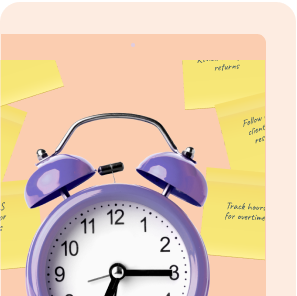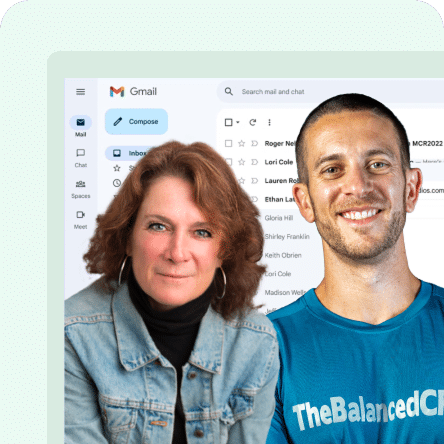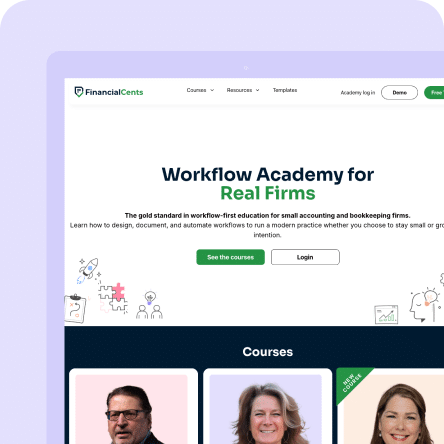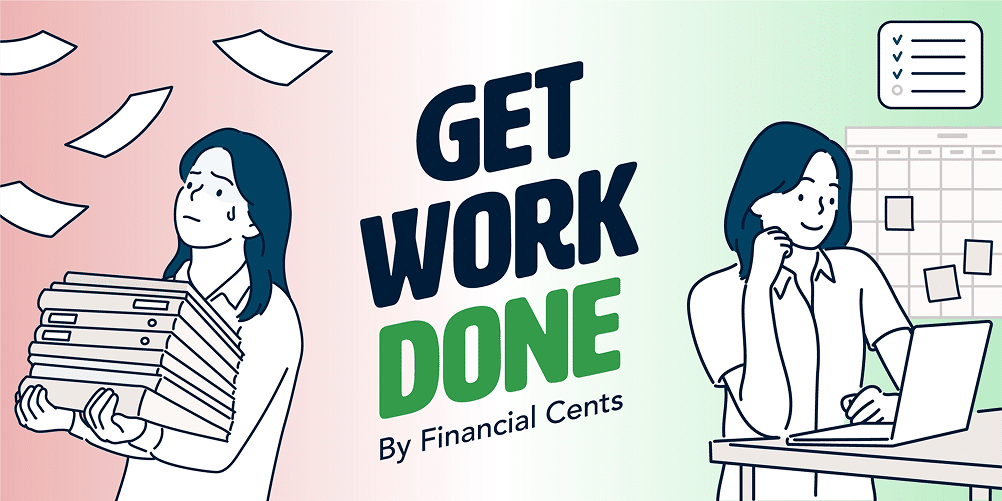S01 E16: How this firm owner built a paperless accounting firm
Guest: Damyan Dimitrov
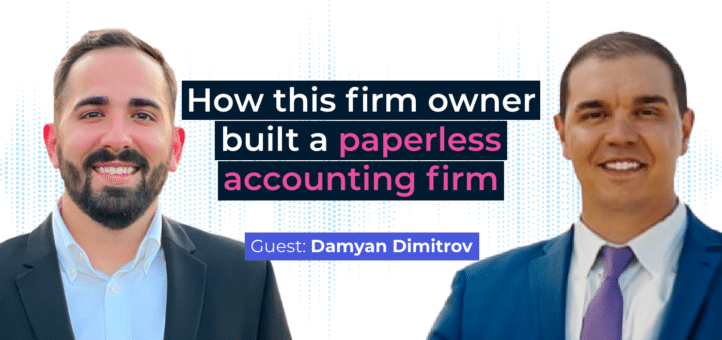
Podcasts » S01 E16: How this firm owner built a paperless accounting firm
Meet Damyan Dimitrov, the founder of Accounting Management Service, an accounting & tax management firm. The firm is made up of 18 team members and they service over 1000 clients.
In this episode, we talk about exactly how he made the transition to a virtual firm and its impact on his firm.
Timestamps:
Introduction 0:01
How do you get your team to adapt to this change? 6:38
Resources for modernising your firm. 10:4
Benefits of switching to a paperless firm. 12:14
What is the tech stack like today? 13:53
Advice to his younger self. 15:24
Implementing paper paperless in a year and a half. 20:24
Transcript:
Shahram Zarshenas
Hey everyone, welcome to the accounting firm podcast. Are you struggling to grow your accounting firm? Not anymore. This is where you get actual insights every week into how to scale your firm. Each week, we will spend 15 minutes interviewing actual accounting firm owners just like you, so you can learn how they overcame the biggest challenges that you will face when growing. Let’s get started. Everybody, today we’re talking to Damyan Dimitrov about how he took his firm, paperless. Damyan is the owner of AMS. They manage a team of 18 people, and currently serve over 1000 clients. Damyan, it’s great to have you on the show today.
Damyan Dimitrov
Sure, thank you for having me. I’m excited to talk with you.
Shahram Zarshenas
Yeah, me too.This is a really great topic. You know, a lot of firms are trying to go virtual or convert from being paper based to going paperless. And it sounds like you’ve been pretty successful at doing this so far. So I’m really excited to walk through this with you today. But before we do, I’d love to just get a little bit of background on the firm, you know, the types of services you guys offer and what you’re all about?
Damyan Dimitrov
Yeah, absolutely. So accounting management services, or AMS, we are a full service, accounting, tax and advisory firm. Our market is small and midsize business owners. We have clients from $100,000 in revenue to over 100 million. And we’re just focused on being that outsource partner for them that they can rely on on a monthly basis. We do like to meet with our clients on a monthly basis because it helps us to really dive into their business, understand their business and be an advisor rather than seeing us one time a year. And we try to give you a strategy.
Shahram Zarshenas
Okay, perfect. Thank you for that introduction. So now let’s jump into the topic about converting from a paper based firm to a paperless virtual firm. So, first, let’s talk about why you wanted to make that transition. So you have this paper based firm, what pain points were you seeing or problems were you seeing that said, we need to go virtual, we need to eliminate all this paper?
Damyan Dimitrov
Yeah, that’s a good question. So I actually bought the firm in January, even though it’s been around from 1989. And the reason I bought a firm was because in 2021, I spent most of the year looking at different firms that are for sale throughout the nation. And I looked at over 50 different firms. And I noticed this trend that it was these great CPAs that are close to retirement, but have great relationships with their clients, but their processes are very manual, or they’re just a little bit outdated. And I thought, there’s so much technology out there that it can be used to streamline the process of any one of those firms. So it’s just a matter of time and effort to take the existing processes and replicate them using technologies like Financial Cents, QuickBooks, Sharefile and so forth. So that was the drive behind purchasing the firm. And then once I purchased it, we said, well, we got through busy season, and we decided to now start to plan on going virtual. So that’s where the idea came from.
Shahram Zarshenas
Okay. You saw that there’s an opportunity to transition into a paper base, make it more efficient, improve the processes, and really make the business more valuable. How did you ensure, like the successful transition, because a lot of firms, they struggle with this, they struggle to go paperless? They hit a lot of obstacles along the way, you know, you may still be going through this process. But it sounds like you were able to buy this firm, not too long ago, you started the transition this year, you made the change pretty quickly. I mean, are you guys done with that process? What was that process like? Did you do anything to ensure success?
Damyan Dimitrov
Yeah, I mean, we’ve definitely learned a lot through the process. If I could go back, I would do it a little bit differently. I mean, I’ll be honest, we rolled the dice on it a little bit, because we’re running out of time. So we started after the busy season in April. But the goal was to finish by the end of the year, and I consider ourselves being there right now. We just moved out of our office, we shouldn’t be able to meet with our clients now, fully, virtually going forward. One of the biggest problems challenges was we have a storage room of paper and the office was full of general Ledgers for each client.
Shahram Zarshenas
Oh wow.
Damyan Dimitrov
And folders and folders. So maybe, you know, 700 to 1000 folders a year. Alright so, that was kind of trying to figure out how are we going to deal with that? How much are we going to see In scanning services are super expensive. Yeah, that was one thing I didn’t even think about. I said, Well, this should be pretty easy. But you know, on stapling all the documents within the folder scanning demand. And we said, oh, one of the employees can do it. So they started doing it. And then that was taking a long time. And it was like, Okay, well, we’re gonna have to go from scanning everything to only scanning the prior year. Right? So that is one of the things that I wish we planned better. But we were on a time crunch. And the idea was that to execute this strategy, we just have to figure out what is the 80%, we’re really at 20%, but how are we gonna deliver 80% of the value, right? So we focused on the main things, and one of the main things was actually implementing a system where we can manage our clients. And maybe their file is outdated, you know, so then you don’t really know if this project not done? So we started looking at the systems to manage that with managing practice management software and I know you’re not paying me to say this. But that was the one that we selected, because I thought it was cost effective and very user friendly. I really think that what you guys have done is phenomenal on that front. But that was probably one of the biggest things that helped us really get this vision together.
Shahram Zarshenas
Thank you for sharing that. And it’s great to hear that from you, actually one of our users, because we really do focus on ease of use. And we feel like that’s something that differentiates us in the market. And that kind of goes into my next question, you know, you’re implementing a lot of the solution, like Financial Cents. And some other solutions would take you from virtual because you need that technology to do that. How do you get your team to adapt that because you said the firm has been around a long time. You recently came in, you acquired it, they had probably their older ways of doing things, they probably been doing them for a long time. Change is not easy. And getting people to adapt to that change is even harder. So how were you successful and getting your team to go from the old outdated ways they were doing things to the new systems that take the firm, paperless?
Damyan Dimitrov
Yeah, one of the main thing was obviously, implementing a system that’s easy to use, that has the training videos that they can spend maybe half a day to really watch, which it’s not even that much. And I won’t lie, we we did lose some staff members and went through turnover, right, because people did not like the changes and did not like that technology implementations. So that was probably our most costly mistake. Not considering people having to leave. But thankfully, you know, there are other employees out there that are looking for opportunities and like the challenge with this change, so we really strive to just bring in people that are tech savvy, and maybe don’t know the system or the software they’re implementing, but are not afraid to go in and say, You know what, I’m going to figure it out, there is an answer out there. So working with them to have that mentality, also keeping them accountable. Every single week, we have a meeting and we asked people, what have they done to improve their process? Or what did they learn something new throughout the week that they can share with the rest of the team? So and then finally, the reporting, right, so every single week, we have a report that comes out. How many projects did you complete? Why is this not updated correctly in the system? So the more reporting and the more accountability we create in the process, the easier it was for everybody to jump on board, because they knew that we’re watching the progress of it.
Shahram Zarshenas
Okay. What about the clients? Right? So it’s not just the team that’s being affected by this change? It’s also the clients and the way they interact with you. I think before this interview, you mentioned you guys just officially moved out of the office last week. So you are fully virtual now. Right? They’re not coming into the office to meet with you guys anymore. And you’re probably using different systems that they’re not used to what was that process like with the clients and how did you ensure that transition for them?
Damyan Dimitrov
Yeah, well, so I’ll start with definitely communicate better than we did. Right. Go make sure that the clients understand and you’ve communicated before it’s happened. I think that’s where maybe we failed. But now after having the conversations with those changes, And then showing them the difference and the value that this adds to them, they start to warm up to it right? You know, before they used to sit in our office for an hour or two, to wait for their tax return to be prepared and then have the meeting. Well, now, during that meeting, first, they don’t have to drive out to our office, they can sit on their couch at home, and have the meeting, after dinner or whenever they want to have the meeting, and it’s more convenient for them. But that meeting is now focused on advising them rather than focused on the let me go back in my office, do the work, and then come back to give you the financials. Right. So they see that we’re adding more value to them through advisory rather, rather than just a bookkeeping service.
Shahram Zarshenas
Okay, that’s great. And what about like any resources? So as you’re going through this process, did you have like any groups or resources that you leaned on to kind of help you with figuring out how to modernise the firm or go virtual?
Damyan Dimitrov
Yeah, absolutely. So shout out to root works. To be honest, that’s probably one of the best resource that we’ve signed up for. They’ve done a really good job at helping firms modernise, and kind of catch up to times. So we rely on them for anything, anytime we have a question or concern about how do we go about this. Has somebody else done this before, and they have all the resources and if you need to, you can always jump on a coaching call with them. And they’ll talk more about that and the issue and if they don’t have the answer, they’ll go to their network and ask, you know, their clients. Hey, Has anybody gone through that? So it’s really good network that has helped us maybe learn from other people’s, you know, shortfalls.
Shahram Zarshenas
Yeah, I’ve heard a lot of really great things about root works. A lot of firms that are looking to make this transition, modernise their firm. Root Works has an amazing community that you can lean on from what I’ve heard, and they put out a lot of really good resources and they got a lot of great webinars and content to help you through that process. So if you’re listening, definitely go check it out. If you haven’t heard of Root works, it’s a valuable place. So one question I had is, now that you’ve made this change, right, you’ve successfully transitioned to a paperless firm and your virtual and modernised now, what are some of the biggest benefits that you’ve seen?
Damyan Dimitrov
Time, I think we’ve saved a lot of time. So one of the best examples is before the clients would come in with their bank statements, and drop off a copy, then we will have an accountant go through every single one of the transactions on the bank statement, then you don’t pass that on to the data first data entry person, they’ll enter it into the accounting system, then the accountant will go back and reconcile and kind of analyse the financials. So that process of how many people have to be involved to enter a transaction into the accounting system, when now with QuickBooks Online or other, you know, cloud based systems, you get that transaction as soon as it happens in the banks. You know, as soon as it happens in your bank account, they send it they send it to us, right. So the only thing that account needs to do is account for it appropriately. So that by itself is the most value there. Another big thing with going through that process is being able to utilise even additional technologies to now help clients with forecasting. Before, you had just lump sum amounts in accounts that you just don’t really know what made it up or what kind of vendor it is. So the analytics can be done much quicker when you have more details in a system because of what entered into the system.
Shahram Zarshenas
Okay, that’s great. And so what does your tech stack look like today? Now that you’ve completed the transition? What are the systems you guys are using to run your firm virtually?
Damyan Dimitrov
Yeah, so we probably have a lot more than we need to. We’ve been adding tech on tech to fix problems, but now you know, this coming year, what we’re gonna do is say, Okay, well, let’s evaluate all that tech stack and figure out how do we consolidate it so it talks to each other? And it’s the most efficient one for us, right? But, you know, from practice management, financial cents. from an accounting perspective, we use QuickBooks Online, but we are still stuck to ultra tax and Thomson Reuter accounting CS because we haven’t fully converted all of our clients from that system to QuickBooks Online. But still a good software software then we’ve got ShareFile to securely share documents that are sensitive for our clients, and then the last as you know, the Microsoft suites, Microsoft Teams SharePoint, those have been great tools to be able to communicate internally and be able to track what’s going on with every document.
Shahram Zarshenas
Okay, perfect. That’s great. That’s a good list of the core, I think what we typically see as the core solutions that a lot of firms have to take their firm virtual. All right. Well, thank you so much for that. If you’re ready. I loved to do this during interview by jumping into the quick fire questions. So, if you go back in time, what would be a single piece of advice you’d give yourself?
Damyan Dimitrov
Well, I had an answer to that once. So honestly, it’s implementing internal controls for the process a little bit sooner, and not relying so much on how the previous owner did that. Right. So it’s one of those things where I think, you know, we said we’re not going to change anything, we’re going to do it the same way. Well, that created a lot of holes in our process that now we’re paying the price for.
Shahram Zarshenas
So just to dig a little deeper, are you talking about you came in the firm, you saw the existing way, everything was done, you just layer technology on top of it. Instead, you wish when you implemented the technology, you looked at the processes and adapted it to the new system? Because the landscape is changing? Is that what you mean?
Damyan Dimitrov
Well, so we didn’t take the processes and said, Okay, well, we’re gonna implant this technology, fix this process. But for example, we kept the previous owner for a while, he kept doing it one way, while we’re implementing it. And so that was part of it. Another part of it is, from like a billing system perspective there, sometimes things were built, he would build one way through his old system, and we would build it through the current system, right? So it just created unnecessary mess that kind of taken it from day one and said, No, this is how it’s going to be done. And everybody’s going to do it the same way, and have the reporting to kind of control it, then it we probably would have not had to do so much cleanup. Okay. It, you know, I’ll tell you like after June of this year, we were able to really control that piece. But, you know, it would have saved us maybe some work that was unnecessarily created.
Shahram Zarshenas
Perfect. Okay. What traits do you think are important to be successful firm owner?
Damyan Dimitrov
To me, I believe that you just have to be a people person and have the patience to understand others, like, what drives them? What motivates them from an employee perspective, and from a client perspective, understanding? What do they value, right? because knowing what they value, you can really understand them better, and also understand what you need to provide them as a service. Because if you’re just telling them no, this is what this service is, and this is how we add value to you. Well if they don’t care about that value, they’re not going to be choosing you for the service. Right. And from an employee perspective, understanding, obviously, what motivates them, that’s something that keeps them. It helps you build the relationship with them to where it’s more than just, I’m your employer, and you’re my employee.
Shahram Zarshenas
Okay, and what out of your tech stack, right, what is one of the tools that you couldn’t live without?
Damyan Dimitrov
It’s Financial Cents. And again, you’re not paying me for this, it really is such a phenomenal tool. You know, because if you have 10 clients, it’s easy to track it in Excel, but over 1000 clients from business and individual and the repeating projects, it’s just too many things to track on that scale. So for us, it’s a matter of how do we report on and have visibility and you know, you guys have done a tremendous job. You’ve built a tremendous software.
Shahram Zarshenas
I appreciate that. I think the team’s gonna love to hear that. So I think we know the answer this one, but just to double check, what is your favourite accounting resource? It could be a group forum blog that you go to for anything and everything. Accountant.
Damyan Dimitrov
Yeah, it’s root works.
Shahram Zarshenas
Yeah. it’s a great resource. Definitely. If you’re listening to podcast, go check it out there. It’s a great programme. Lastly, how many hours a week do you typically work?
Damyan Dimitrov
So I’ll be honest, I do work probably 50 to 70 hours a week. But that’s because I’m so passionate about what I’m doing. And I just enjoy the process of improving the company in it. And I think that if I work 50-70 hours or weeks, somehow I’ll get there faster, and finish the goal faster. That’s not always the case because there’s always burnout but I just love it. You know, I just enjoy what I’m I’m doing and I enjoy fixing the bolts on our business and you know the results and the impact that it makes on our employees and our clients as well. I consider myself a little bit of a workaholic, but do not tell my wife that I told you that.
Shahram Zarshenas
But she’s not listening.
Damyan Dimitrov
I’m not gonna send her the link to this!
Shahram Zarshenas
We’ll definitely have to get you to come back on again next year, once you know you’ve had some more time to continue to improve the products and your processes. If you’re constantly improving it, I’d love to see where you guys are a year from now. Because I’m sure you’re gonna see a lot more dividends payout from the processes you’ve just implemented this year. It’s crazy that you’ve been able to do so much in such a short period of time. I mean, I talked to some firms that they’ll take just a year to evaluate a single solution, and then months to implement it. But you’ve done several things, several implementations across your firm and completely taken it paperless. And just in less than a year. It’s incredible.
Damyan Dimitrov
Yeah, I mean, it’s been challenging. It’s lots of learning curves. But we definitely are at a much better place right now than we were in the beginning of the year. And I do agree with the planning approach, like you said, you know, maybe take a year, but I think that there’s a place for that. And sometimes that does slow you down. I think with the technology and the ease of implementation of the technology that we’re putting into our firm, we’ve been able to do it that allowed it to kind of speed up the process, right? You don’t have to do a onboarding and consulting engagement for eight to 12 weeks, right? For Financial Cents, you plug and play. So when it’s technology like that, you can test it out, figure out if it works. If it doesn’t work, then you move on to the next one, right. And so you can test it as you’re implementing.
Shahram Zarshenas
Yeah, that’s what we see a lot of the times with. A lot of firms that use something like Click-Up become really popular with accounting firms. But it’s not built for accounting firms. It’s built for everyone. So you have to either spend a lot of time trying to figure out how to customise it, or pay a consultant to come in to customise it. And that can really extend that onboarding, not just the implementation, but also the training for the team, because it just adds another layer of complexity.
Damyan Dimitrov
I agree. We did try Clickup. And that was one of the reasons why we didn’t like it. It was just too generalised.
Shahram Zarshenas
Yeah. Okay. Well, I appreciate you coming on the show. This was an very insightful interview. And I think a lot of people are going to love what you talked about today. There’s a lot of firms trying to go paperless. And if you’re listening, this is a lot of great tips here. Thanks everyone for listening in. If you enjoyed this podcast, please go write a review. This will help other firms just like you find our podcast so they can get insights into how to grow the firm. See you next week.

